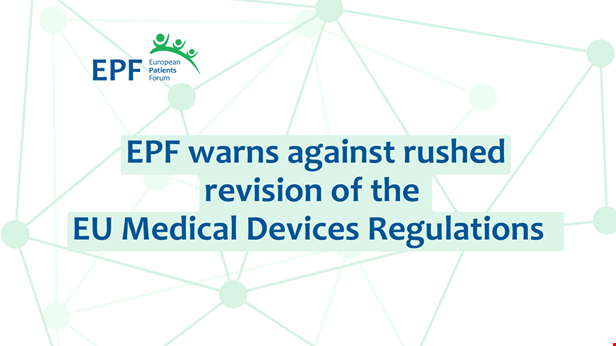EPF warns against rushed revision of the EU Medical Devices Regulations

EPF is very concerned about calls for an immediate reopening of the Medical Devices Regulations and fast-track amendments to the legislation within 100 days of the new European Commission taking office.
A rushed revision would not serve the interests of European patients, who rely on a fit-for-purpose regulatory framework for medical devices and a thorough, evidence-based policy-making process.
The Medical Devices Regulation (MDR) and In-Vitro Diagnostic medical devices Regulation (IVDR) were adopted as a result of serious shortcomings of the existing regulatory framework to ensure patient safety and a need to significantly strengthen requirements and oversight across the devices’ lifecycle. The COVID-19 pandemic also reminded us collectively how important access to reliable diagnostic tests is to inform public health decisions. At the moment, more information is needed to assess whether the Regulations have achieved their primary objective.
We strongly welcome the European Commission’s decision to conduct a thorough evaluation of the impacts of the MDR/IVDR. We also welcome planned activities to address urgent issues and smoothen implementation, including capacity-building initiatives, efforts to improve harmonisation and predictability, specific measures targeting orphan devices, and maximising the role of the expert panels. Ensuring that patients continue to have access to the devices they need remains a priority. As we move forward however, it is imperative that we wait for the results of the forthcoming evaluations and have a clear overview of the issues directly related to MDR/IVDR before any “quick fixes” through legislative changes are considered.
The full implementation of both the MDR and IVDR has been delayed three times in four years, with some devices now benefiting from a transition period of over 12 years (until Dec 2029). The extensions granted aimed precisely to give more time to all stakeholders to adapt. Changing the legislation at this point would be premature and could lead to unintended consequences for patient access to safe devices.
Public health and the interests of patients should remain at the heart of the EU system. We urge all stakeholders to step up their efforts and continue working on the implementation of the current framework.
We also call for the swift roll-out of a fully functional EUDAMED that addresses patients’ needs and to prioritise patient engagement and access to information. EUDAMED has the potential to considerably improve traceability of devices across their lifecycle, facilitate post-market surveillance by competent authorities, and increase the overall transparency of the system for patients and healthcare professionals. This is essential to building trust in the system across the board.
